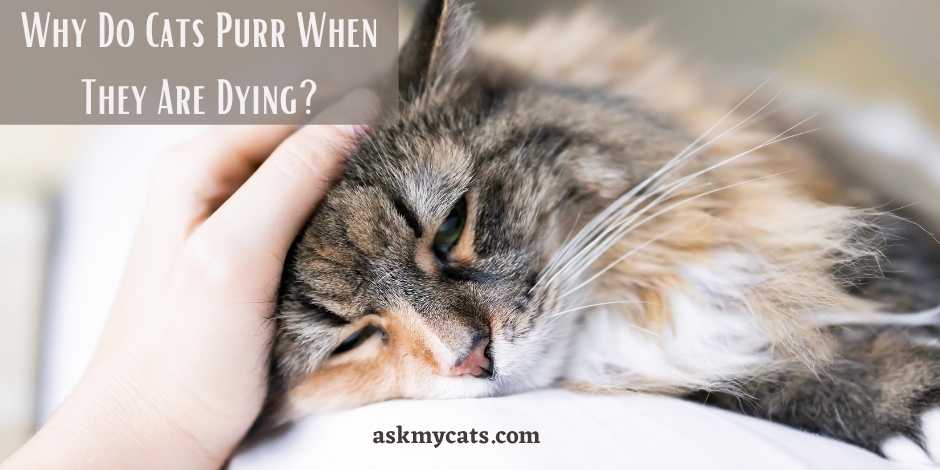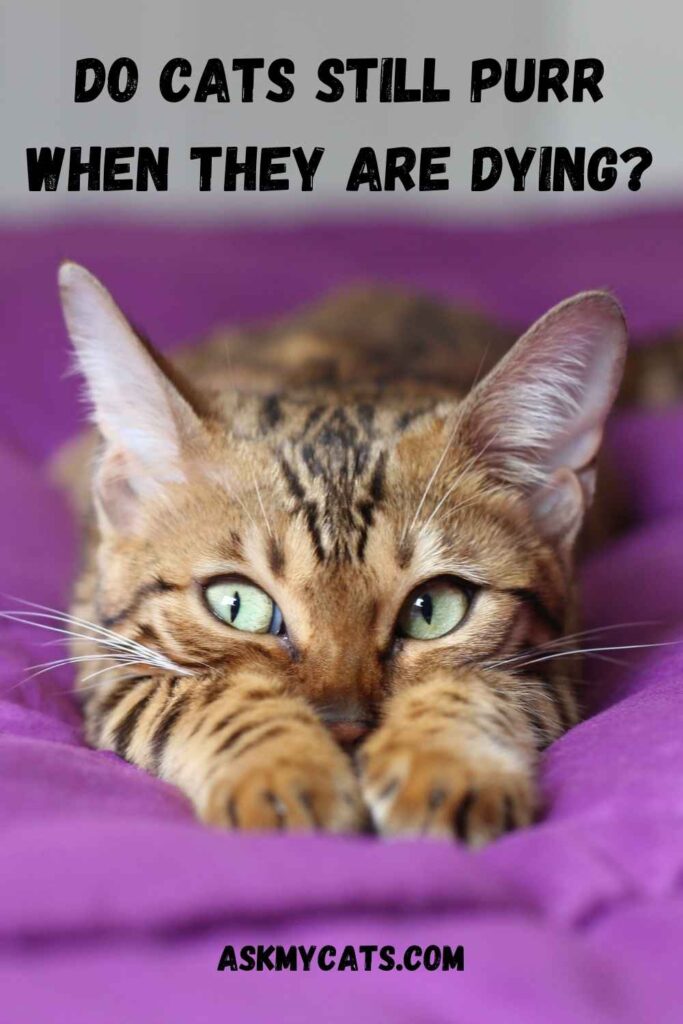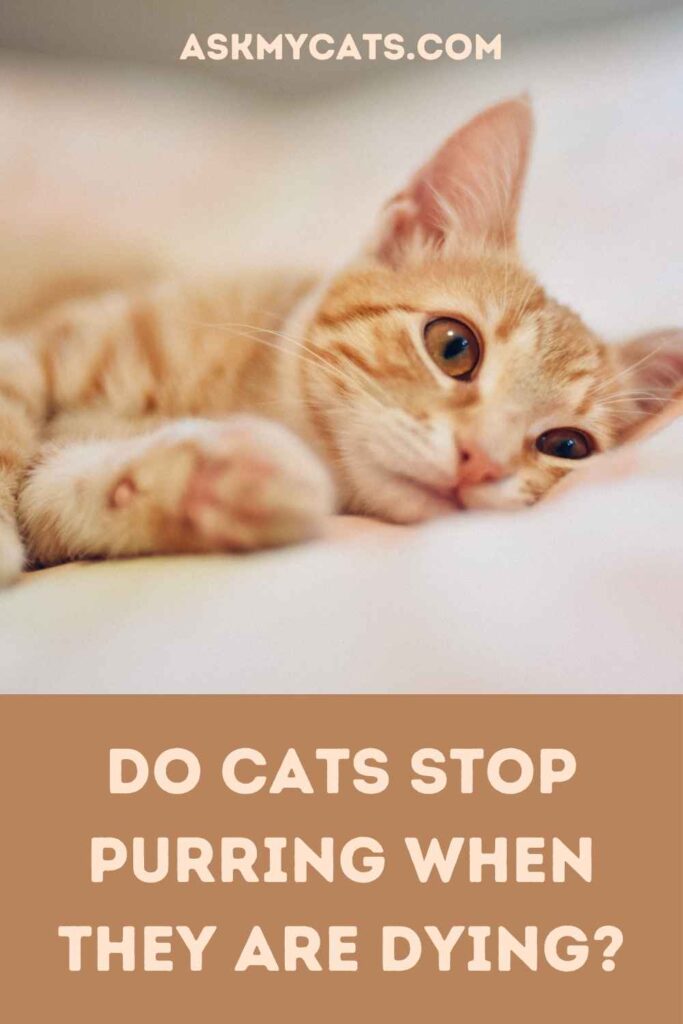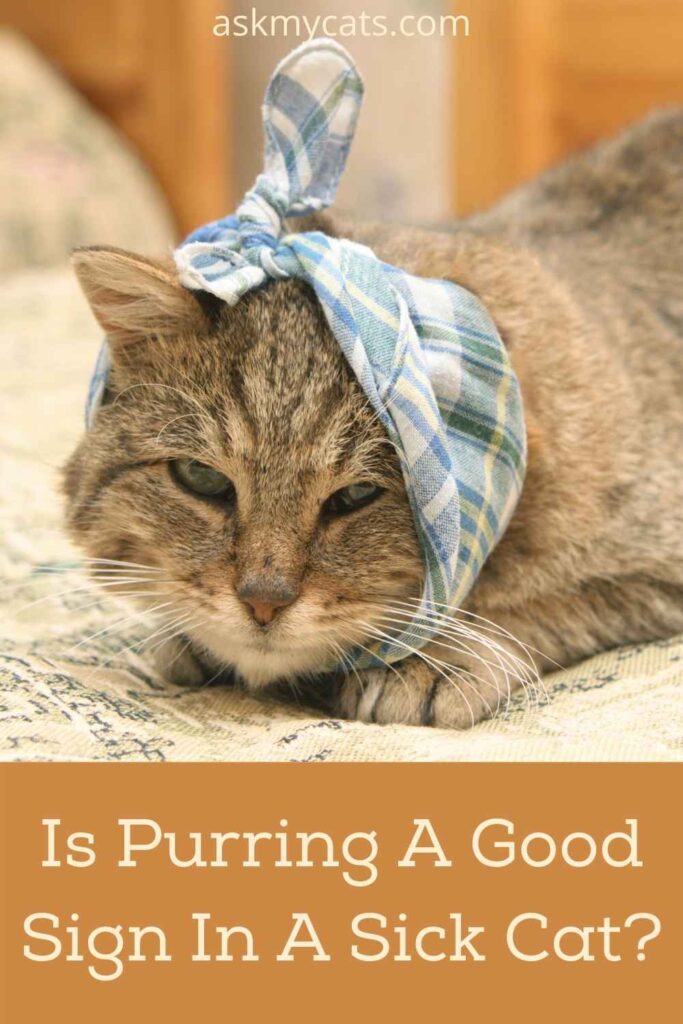While some cats prefer to be alone in their dying days, others prefer to be as near as possible to their loved ones.
They may return to a favorite bed, blanket, or pillow to make themselves at home, and they may obsessively follow their owners because they don’t want to be left alone.
While dying cats may purr to indicate their pain, they may also purr as a coping strategy. Purring has been found to strengthen the cat’s muscles and may even produce endorphins that assist her to deal with the discomfort she’s experiencing.
Let’s take a closer look at why cats make purring sounds while they die!
Key Takeaways
- Cats may purr when they are dying or being put to sleep.
- Purring may be a coping mechanism for cats in pain or discomfort.
- Dying cats may seek isolation or be sedentary.
- Paying close attention to a cat’s purring can help determine why she is doing it.
- Cats may purr to signal that they are ready to be put to sleep.


Give Your Cat the Perfect Day
Get the Free Ebook!
Do Cats Still Purr When They Are Dying?
Many cats purr when they’re dying or being put to sleep. They were purring right up to the end because he was undergoing a lot of problems in his body at that time. When cats purr, people believe they’re happy which the case is not always though.

A cat’s death is never easy, but understanding the indications that she’s nearing the end may help you make her as comfortable as possible.
You won’t always be able to heal her, but you can figure out what’s bothering her and help her go through it as painlessly as possible.
When a cat dies, even if it is from old age rather than illness, her body begins to shut down. She may exhibit some of the same indications of frailty as a sick cat, such as failing to use the litter box, refusing to play, or refusing to eat.
Her senses may not be as acute as they once were, and she may find it difficult to see or hear you.
Her one sense that doesn’t degenerate is her sense of touch, so she’ll never cease feeling your comforting pets, even at the end.
When a cat is used to being attached to your lap, she may seek isolation if she thinks death is near. Don’t take it personally; it’s a natural reaction. A dying cat in the wild would isolate herself because she knows she is susceptible to predators.
This might also be a result of stress, since her senses are deteriorating and she feels physically weak, making her desire to avoid any stimulus or excitement.
Dying cats are frequently sedentary, both because they are physically frail and because they lack the desire to play and exercise. For a dying cat, even walking about the home might be a burden, so don’t be shocked if she just wants to lounge around.
She may be so weak that she has trouble getting up, walking, or climbing into her litter box in severe situations.
While some cats prefer to be alone in their final days, others prefer to be as near to their family as possible.
They may return to a favorite bed, blanket, or pillow to make themselves at home, and they may obsessively follow their owners because they don’t want to be left alone.
Purring has been found to strengthen the cat’s muscles and may even produce endorphins that assist her to deal with the discomfort she’s experiencing. While dying cats may purr to indicate their pleasure, they may also purr as a coping strategy.
Pay close attention to your cat’s purring to figure out why. Are they purring in your lap, all cuddled up? If that’s the case, your cat is probably just happy to be with you. Are they grooming themselves and purring loudly? Then examine your cat for any indications of pain or damage.
And if your newborn kittens, the pregnant mother cat, or the mother cat is purring, it’s most likely part of the mother-kitten bonding process.
Our cats don’t only purr for us, despite what we may believe at times. When kittens purr, it’s a method for them to connect with their mother. They purr throughout pregnancy and toward the end of their lives when they are dying.
Your cat may be resting on your lap, purring dreamily one minute, and then biting you the next. What exactly does this imply? Maybe your kitty pal was already feeling under the weather, and your casual stroking rubbed them the wrong way.
Maybe your cat just gave you a ‘love bite,’ which is a show of devotion. Biting may also be a symptom of aggressiveness in cats, so pay attention to what your cat loves and dislikes and give them plenty of space to prevent getting bitten again.
Cats will usually communicate their desires to you. The greatest rule of thumb is to allow your cat to come to you for hugs and to respect their body language when they say no.
Must Read: Cat Purring Effect On Humans: The Power of Cat Purring
Do Cats Stop Purring When They Are Dying?
Cats will stop purring when their life will come to an end finally. Until then, he may still purr and make their owners aware of their presence.

When your typically loving little bundle of joy begins to attempt to hide from you, it might feel like a personal affront. When you try to pet or soothe them, they may become agitated or lash out instead of purring as they usually do.
If cats sense that they are nearing the end of their lives, it is natural for them to want to be alone so that they may rest and remain peaceful.
If they prefer to spend time alone, such as behind the sofa or under the bed, try not to take it personally.
If your cat begins to spend more time outside than usual, as well as seeking out cool, quiet areas such as behind the shed, in your car, or in the bushes, this might be a sign of something more serious.
However, that drastic change in behavior might also function in the opposite direction. When they realize their time is running up, many cats that prefer to be left alone will become a yearning for attention and calming hugs.
They may also begin to follow you around frequently, despite the fact that you generally just receive a quick appreciative leg rub when you give them their meal.
Interesting Read: Do Older Cats Purr More or Less?
A shift in behavior like this is typically appreciated. However, be aware that such fluctuations might be an indication that your cat is dying or unwell.
Your cat may not be as active as normal if he or she is in a lot of discomforts or feels unusually weak.
You should be concerned if your pet suddenly loses interest in pursuing their favorite toys or refuses to accompany you into the kitchen even when food is there.
When they can’t or won’t move for an entire day, even to relieve them, that is obviously not a good sign, and it’s time to contact your veterinarian.
If they hunt for themselves or have had a good meal before, some cats may cheerfully miss a meal. If they go two or three days without eating, it might be an indication of a medical condition.
This does not necessarily imply that they are in immediate danger. However, it’s always a good idea to check with your veterinarian!
Must Read: Do Cats Purr When They Are Sick Or In Pain?
Your cat may refuse to eat because of parasites or other medical problems. A lack of appetite in cats, on the other hand, is not a healthy indication, especially if your cat is elderly or ill.
A cat-on-cat fight or an active existence outside might leave your intrepid feline looking a little worn out. Cats, on the other hand, will always strive to clean up any mess as quickly as possible.
Regularly dying cats have less energy to devote to personal grooming. This can be exacerbated by the fact that they may be shedding hair or losing fur in huge areas.
It can also be accompanied by a loss of appetite, causing them to become significantly thinner than normal.
It’s an indication that they’re losing their vision if they start wandering into walls. A sluggish, sedentary gait might suggest that their capacity to think rapidly is being impeded by sickness.
Unsteady breathing is always a cause for concern since it might signal a problem with the respiratory system.
Whether you’re not sure how to determine if a cat is dying, see your veterinarian. Make arrangements for your veterinarian to come to you rather than taking your pet to the vet’s office in a cage.
Try to recall all of the good occasions you and your cat have shared. Also, keep in mind that death is an inevitable aspect of existence.
Your cat will always be grateful for the love and care you gave them throughout their lives. They will also admire you since you were there to assist them in the end.
Interesting Read: Why Does My Cat Lay On Me And Purr?
Is Purring A Good Sign In A Sick Cat?
Sick cats might be purring, which cats do when they are pleased as well as when they are sick or in pain because a cat that is having trouble breathing may refuse to sleep on his side and keep his head up.

They frequently lie in a slumped stance, silently. They might not pay attention to their appearance.
Your cat may have a problem if he regurgitates food quickly after eating. Vomiting food after it has been eaten might suggest illness, a blockage, or a variety of other issues.
If your cat vomits for more than a few hours or many times in a day, she should see a veterinarian.
You should seek medical help if your vomiting is followed by fatigue, diarrhea, or a reluctance to move. When in doubt, it’s always preferable to call the veterinarian rather than wait and see what happens.
Although purring is generally associated with happiness in cats, it may also be used to convey when they are worried, nervous, or seeking to communicate other requirements, such as pain or discomfort.
If your cat purrs while displaying any of the other symptoms listed above, the purring might be caused by discomfort. In fact, when a cat is in discomfort, its purring may increase.
When a cat is in discomfort or sick, he or she may breathe quicker or shallower. It’s also possible that they’ll pant. Because both the stomach and chest muscles are involved in breathing, you may feel a shift in their action.
At home, you can monitor your cat’s respiratory rate: When your cat is sleeping (at rest), count their breaths for 15 seconds and multiply by 4 to get the number of breaths per minute.
You may use your phone’s timer and count their breaths by placing your hand on their chest. Alternatively, watch their chest rise and fall to equal one breath.
Cats breathe at a pace of 12 to 60 breaths per minute. When you’re counting, make sure your cat isn’t sniffing, awake, or moving about, as this will result in incorrect results.
Some of the Interesting reads regarding cat purring:
- Why Do Cats Purr? The Science of Cat Purring
- Why Doesn’t My Cat Purr?
- How To Make A Cat Purr?
- Do Cats Purr When They Sleep?
- Why Does My Cat Purr When He Sees Me?
- Why Is My Cat Purring So Much?
- Differences In Purring Between Cat Breeds
- Why Does My Cat Purr So Loudly?
- Why Do Cats Purr When You Stroke Them?
- Can Cats Control Their Purring?
- Do Cats Purr When They Are Happy?
- Do Cats Breathe Faster When Purring?
- Why Do Cats Purr When You Talk To Them?
- Why Do Cats Wag Their Tails While Purring?
- Why Does My Cat’s Purring Sound Congested?
- How To Purr Like A Cat?
- Why Do Cat’s Noses Get Wet When They Purr?
- Why Is My Pregnant Cat Purring So Much?
- Why Do Cats Purr And Knead?
- Do Feral Cats Purr?
Frequently Asked Questions
How do you comfort a sick cat?
Ensure that the cat is kept at a suitable temperature: if it’s cold, offer blankets; if it’s hot, provide shade by providing a calm, dark environment free of other pets or youngsters. Ensure that there is enough water accessible, especially in the event of diarrhea. If the cat refuses to drink, moist food should be provided.
Can cats sense their own death?
They’re also intuitive in the sense that they can sense when they’re going to die. I’ve heard of cats hiding or “running away” from home in order to find a calm spot to die. As a result, cats are so tuned in to their bodies and their surroundings that they can sense indications of impending death.
What does a cat sound like when in pain?
A yowl or howl (which sounds like long, loud meows) indicates that your cat is in distress—stuck in a closet, searching for you, or in pain. If your cat is making this noise, locate them. These noises, on the other hand, are part of a mating activity in unaltered cats.
Final Words
Cats, like other animals, have a keen sense of intuition and can detect things that people are unable to. Their vision and sense of smell, for example, are superior to ours.
Because cats interact with one another largely through body language, they must be aware of biological and behavioral changes in the animals surrounding them.
Detecting weakness, as well as changes in body temperature and odor, is part of this process. They’re also intuitive in the sense that they can sense when they’re going to die.
Feel free to ask your questions in the comments section below!
Interesting Read: Why Does My Cat Drool When He Purrs?
Interesting Read: Why Does My Cat Purr And Bite Me?

Excellent article. Very helpful. Thank tou
Thanks.
Happy Cat Parenting
Very informative and well written!
Hey Jessica,
Thanks for your appreciating words.
Happy Cat Parenting
Thanks for the information it is very helpful. I just lost my cat 2 days ago and it is very painful. Knowing the behaviors you listed helps. I didn’t know those things before. I don’t know all the answers to why he died, but it helps me to cope better. I feel like the night before he was not getting better like I had hoped, but preparing me. And he wanted to be near me. I’m glad I was able to spend that time with him. I will miss him so much! Thanks.
Hello Tee,
Sorry to hear about your loss and glad to know that you find our information helpful.
Our cat is some 20 plus years old and though she declined for a long time, she is now not eating and hardly drinking. We have been going to comfort her at her box frequently and when she purrs it is loud and different than how she normally purred. She still will flip her tail once in a while. It is hard saying goodbye to her. Thank you for the information.
I feel glad to have helped you out.
Happy cat parenting
My 18 year old best friend has cancer and is slowing down by the day, he seems to be loosing an interest in eating last couple days, he still purrs when I pet him…… This is so hard, I feel terrible when I have to go to work all day and am not able to be with him….my schedule has been lax recently which has allowed me to be near him more but it will ramp up a bit this week and I am afraid I may not be able to be here with him enough in what seems to be his last days 🙂 I just want to be able to comfort him as he needs it…I do not deal with the death of animals or pets well at all. it is and has been really hard.
Sorry to hear about it. I am sure your cat has lived his best life with you.
Excellent article, my cat has an enlarged heart and I have been told by my vet that she has a few months to live. I found your article as she is purring more than usual, and I wanted to know why, and you have explained why this so well. I’m not ready for my cat to die, but whilst I am reading your article in floods of tears, I feel I have a better understanding of what to expect. Thank you
I am glad that this article could be of some help to you.
Your information and advice on your Website is so very helpful to me as I have an older cat, Oliver, who is in the process of dying. Your information was so much more helpful than any information I received from my local vet. Thank you so much.
Thank you for this article. I’m currently sitting with my cat who is actively dying from mouth cancer. Tomorrow is the day. I know it’s best for him but it’s so hard. he’s in pain. He’s tired. He wants to eat but he can’t. I didn’t think it would be this hard. He’s been my best buddy for the last 9 1/2 years. We’ve been through so much together including the loss of my husband. I’m doing this on my own. It’s just so hard.
I’m so sorry. I lost my 16 yr old on Mothers Day, just recently. Will be praying for you🙏🏼💜
Thank you for all of your information. I think we will shortly be losing our 15 year old Simba, he looks to have cancer and is currently having steroid injections to keep him comfortable as he still has some fight in him, but I know any day now I will have to make that sad trip to the vets which all of us responsible pet owners do. I know have more insight from your post than I feel I had from my vets. I’m heartbroken already and he is still here at the moment, he has been my best friend and kept me sane through the Covid pandemic, gave me a reason to get out of bed every day. Bless you all that have or may shortly be losing your fur baby
I am sure your cat has lived his best life with you. He is just going to go to a better place now.
hello i have a russian blue long haired cat. she is 22 years old. i love her so much. recently her purring has gotten louder and her mouth seems to be open a little when purring. she is sleeping more, near me all the time, has some arthritis and i know its time to bring her to the vet. she is such a good girl. well trained also.. she would come and let me know when she used her litter box so that i could go and clean it out immediately.. she had me trained…!! ive had my first cat for 21 years and another cat for 4 years he then got cancer. ive had to put these cats down i know how hard it can be. i will miss makayla so much… i may take her to the vet tomorrow my vet is off today on wednesdays. i hate the thought of doing this… but i know it is for the best. i hope i have the strength to do this… she still eats, drinks her water, and moves her bowels regulary and urines regularly. just don’t know if its time yet… can you give me any suggestions? should i just let her go to kitty heaven now.. after 22 years, she had a wonderful life… thank you so much for your article and any reply you can give me.
I’m so sorry that you’re going through this difficult time with your beloved Russian Blue. It’s never easy to say goodbye to a beloved pet, but it’s important to do what is best for them. If you’re unsure about whether it’s time to say goodbye, it might be helpful to have a conversation with your vet about your cat’s quality of life and any treatment options that may be available. Your vet can help you understand what to expect in the coming days or weeks and can provide support and guidance as you make this difficult decision.
In the meantime, it might be helpful to spend as much quality time with your cat as possible, providing her with plenty of love, affection, and comfort. It can also be helpful to let your other family members and friends know that your cat is not doing well, so they can provide support and comfort as well.
Again, I’m so sorry for what you’re going through, and I hope that this information is helpful. Please don’t hesitate to reach out if you have any other questions or concerns.